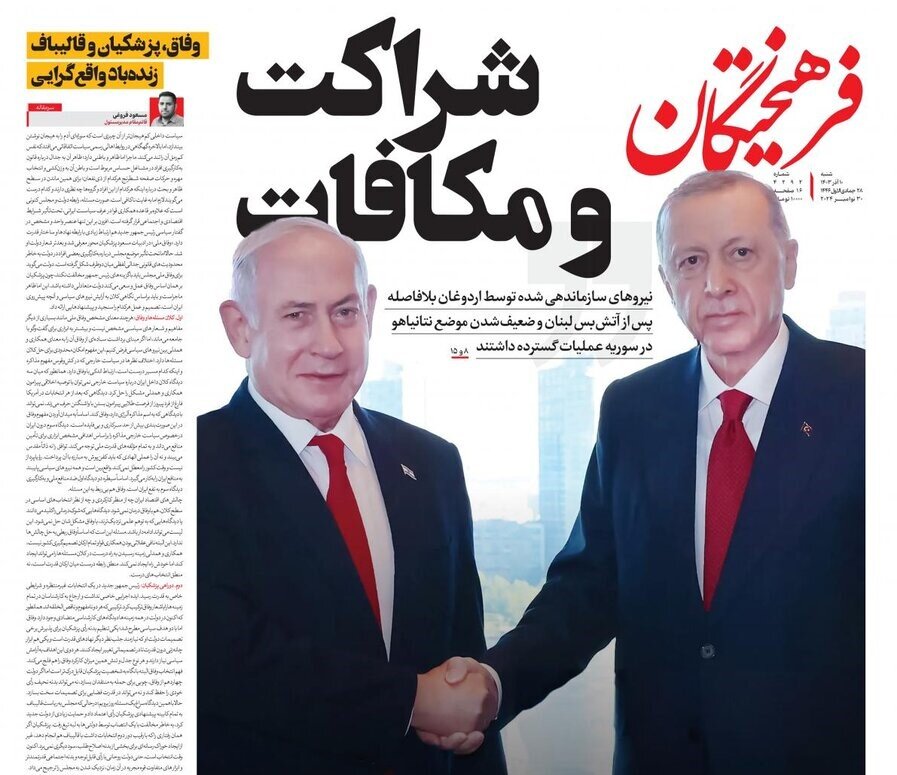Anger of pro-Pahlavi media over Lebanon-Israel truce

TEHRAN - In a note, Farhikhtegan addressed the incitement of the public atmosphere against the Axis of Resistance by the hostile media.
It wrote: After the ceasefire agreement between Lebanon and Israel, certain media outlets such as Iran International and the BBC Persian, which are affiliated with Reza Pahlavi, have tried to incite the public atmosphere against the Resistance. These media are dissatisfied with the ceasefire negotiations. "The strength of Hezbollah's forces" shaped the course of the Israeli war on Lebanon. The ceasefire demonstrated Hezbollah's deterrent power. This issue is considered a failure for those media that have always tried to weaken the Resistance. The displeasure of the pro-Pahlavi and anti-resistance media outlets, more than anything, shows the success of Hezbollah and the Axis of Resistance in general. These days, while the eyes of the world are focused on the developments in Lebanon and Israel, Hezbollah has once again proven that power and perseverance can change the rules of the game in the region.
Kayhan: Amusing Iran to negotiation is Europe's deception operation
In an analysis, Kayhan discussed Europe's goal of starting a new round of negotiations with Iran and wrote: The sequence of events in recent months, with increasing pressure from the Europeans, brings to mind the suspicion that the negotiations are a kind of harassment from the European side and they intend to amuse Iran to lose its focus on confronting Israel's crimes. The ultimate goal of the West at this point is not to negotiate and resolve the problems and misunderstanding with Iran on the nuclear issue, nor is it to create a framework for dialogue about false claims that Iran has supplied arms to Russia in its war with Ukraine. The current events in the region indicate that the current negotiation is more than anything a harassment operation to amuse Iran and create a situation for a more severe blow to our country. It seems that Europe's insistence on negotiations and the recent entry of Takfiris into the battlefield are two new elements of the American game to reduce the pressure on Israel. The sequence of ceasefire in Lebanon and the activation of Takfiris in Syria shows the determination of America and Israel to pressure Syria to accept their demands to stay away from Iran and the Axis of resistance.
Donya-e-Eqtesad: Return of German ambassador to Iran to reduce conflicts
In a commentary, Donya-e-Eqtesad dealt with the return of the German ambassador to Iran. The paper said: Concurrent with the start of nuclear talks between Iran and Europe in Geneva, news emerged about the return of the German ambassador to Iran. Diplomatic relations between Iran and Germany have been strained many times over the past years. The examples are Germany’s position toward the 2022 unrest in Iran, the position of the German foreign minister regarding social developments in Iran that year, and the closing of the Hamburg Islamic Center. The death of (the Iranian-German citizen) Sharmahd that Germany decided to close the Iranian consulates in the country was the newest example of the crisis in the Tehran-Berlin ties. Anyway, German Ambassador Potzel has returned to his workplace to continue his mission in Tehran, but there is still no news about the reopening of the Iranian consulates in Germany, and the level of tension between the two countries is still high. Some experts describe Iran's explanations regarding the natural death of Sharmahd and the resumption of nuclear negotiations between Iran and Europe to reduce the level of conflicts as the reasons for the return of one of the ambassadors of the countries involved in the negotiations.
Iran: The first step between Iran and Europe
In an article, the Iran newspaper discussed the beginning of negotiations between Iran and Europe. It said: The positive atmosphere in bilateral talks on Thursday spread to Friday's meeting between the diplomatic teams of Iran and the European troika. It seems that Berlin, Paris, and London are trying to use the initial understandings reached with the Iranian delegation in the recent session of the UN General Assembly as the basis to resolve the differences in Geneva and turn them into a prelude to close the nuclear file and lift the sanctions. However, an insistence on certain issues by the West, such as activating the "snapback" mechanism, will make it difficult to lead the current negotiations toward a result and turn the JCPOA document into a basis for new talks. Upon the revelation of the desire of all parties to update the text of the JCPOA, it is important to reach a new understanding in which the sunset clauses in Iran's favor will continue to expire.
